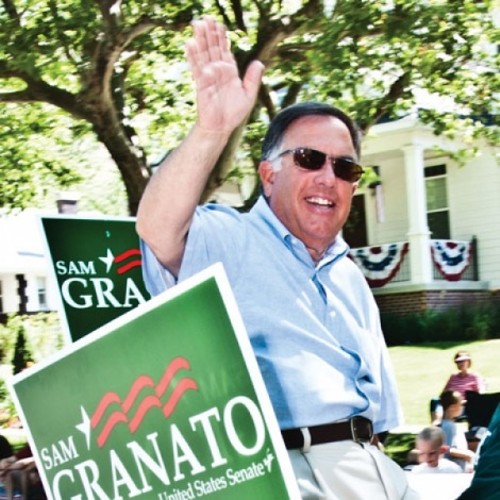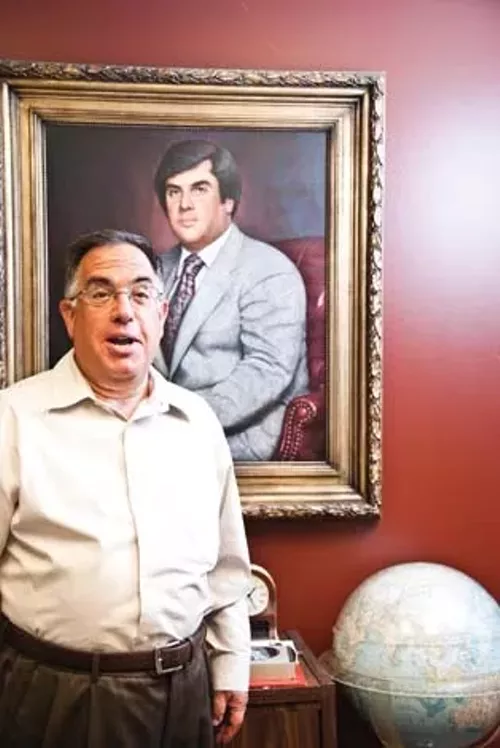Desperately Seeking Sam Granato
The Democratic Senate candidate tries to win voters in a Republican wasteland.
By Josh LoftinInitially, my Independence Day Eve task sounded simple: Watch Sam Granato campaign around the valley at various patriotic events and find a few “average voters” to say insightful things about the affable Democratic candidate for U.S. Senate. The biggest challenge, I figured, would be dealing with the throngs of stone-sober patriots drunk on America, a difficulty I addressed by stocking a cooler with beer and keeping it close beside me.
With eyes peeled for Granato’s parade entry, I somehow miss him while sending a quick Twitter update. I spot him from behind, waving from the back seat of a convertible 1968 Cadillac, while a half-dozen volunteers surround the cream-colored car, throwing taffy and carrying signs.
I catch up with Granato again near the halfway mark of the parade route, where I mingle with the crowd to gauge its reaction as he passes. What I witness bothers me, especially on a holiday when Americans rally around democracy: Hardly anyone notices him, especially the adults he is wooing. No shouts or murmurs of support—about the only thing anyone sees is the car.
After he’s passed by, I ask people along the route if they remember seeing Granato. After two-dozen blank stares, I retreat to a spot of rare shade behind a convenience store and crack a beer to help quell my frustration. Granato is the Democratic Party nominee in a statewide race, yet he’s invisible—despite having declared his candidacy more than a year ago. It’s not like I expected the crowd to receive him as a celebrity; I just wanted some response, any response, to fill out this profile.
And it wasn’t just in Kaysville. The scene repeats itself at the Sandy parade later that afternoon, and by day’s end, my search for sound bites about Granato has devolved into a jingoistic nightmare. Sunburned, I feel my head start to spin—in part because of my all-day buzz, but mostly because Granato as candidate for U.S. Senate seems more myth than reality.
What does it take for voters mostly indifferent to Democrats to start seeing a candidate like Sam Granato? How can he possibly bore through the din of trumpeting politicians, teenage girls pushing wheelbarrows loaded with horse droppings and marching bands sponsored by fast-food joints? I hope to corner Granato after the Sandy parade to ask him that question, but the patriotic tension in the air scares me. I flee suburbia, deciding it best to talk to Granato at a more sober and less paranoid time.
Perfect on Paper
It’s easy to write off Democratic candidates in Utah. But Republicans calling the shots in this year’s Senate race have taken on a Mike Tyson persona: dominating and potentially unhinged. The incumbent since 1993, Sen. Bob Bennett, R-Utah, is gone. Attorney and constitutionalist Mike Lee is the Republican nominee, after a rough primary that forced Lee to stake out the far right of the political spectrum. That leaves a gaping hole in the political center that could be fertile ground for the moderate Granato, who possesses many desirable attributes for a Democratic candidate running a statewide race: He’s a practicing Mormon, a successful small-business owner with some name recognition and a native of the state who grew up in Bountiful and went to school in Cedar City.
Although he says he is a full-time candidate, the 60-year-old Granato has continued to manage his business and spends at least a few hours every day at the corporate headquarters, located just off his flagship deli/store (he owns three) and warehouse at 1632 S. Redwood Road. The office walls are covered with photos of friends and family, with the two of the most noticeable being shots of Granato standing with Thomas Monson, prophet and president of The Church of Jesus Christ of Latter-day Saints, who Granato says he meets with regularly and who he consulted with before declaring for the race.
When asked about his religious bac%uFFFDkground, however, he says that he “grew up in a family with a lot of dynamics.” He was brought up a Mormon by his mother, whose ancestors came from Ireland to Utah with Brigham Young and helped settle areas in southern Utah at Young’s direction. His father, Frank Granato, however, was “an inactive Catholic but very active Italian,” and, thus, proud of his Catholic heritage. He also was an influential Democrat.
“Nobody ran for office as a Democrat without the permission of my father. I was raised with very Democratic values and was taught to be compassionate and take care of other people,” he says.
Initially, he helped his family raise goats in the hills above Bountiful and sold goat cheese. When World War II ended, many soldiers returned from Europe with a taste for foreign foods, so his father began importing specialty foods—Italian, especially—to sell to neighbors alongside the cheese and produce from Sam’s uncle. Eventually, the goods that Sam helped deliver in a push-cart turned into a wholesale enterprise supplying restaurants and grocers. Now, along with Italian imports, Frank Granato Importing Co. sells everything from french fries for chain restaurants to pastries for small coffee shops.
After high school, Sam attended what was then Southern Utah State College in Cedar City—it’s now a university—for a year. In 1969, at the age of 19, instead of going on a Mormon mission—which his father encouraged him to do—he joined the U.S. Army Reserves. His stint in the military lasted barely six months, however, because of high blood pressure that resulted in an honorable discharge. He returned to SUSC, earned a business degree and immediately returned to the family business. He would eventually become president of the company in 1991, when his father died.
“I was in the family business before Day 1,” Granato says. “I was born into it.”
The family business not only provided a career but also introduced him to his wife, Ann, when he was 25. At the time, she worked as a purchasing agent for St. Mark’s Hospital and bought food from the Granatos. Together, they have raised a family of four children, including now 31-year-old twins (a son and daughter), a 27-year-old son who is a professional equestrian rider and a 20-year-old son.
Like his father, Granato has remained active in the Italian community and in politics, although not always as a Democrat. In fact, he spent much of his life as a registered Republican, beginning as an elected delegate for former Gov. Norm Bangerter. To this day, many of his most influential political friends are Republicans, including Utah’s senior senator from Utah, Orrin Hatch, and one of his campaign co-chairs, Mac Christensen, aka “Mr. Mac.” (The other co-chair is Frank Layden, formerly coach of the Utah Jazz.)
He defends his Republican ties by saying he is not a party loyalist. “I go for the person, not just because of the party. I try to have enough discernment to figure out who the better candidate is—and support them.”
The politician who may have most influenced Granato was former Gov. Jon Huntsman Jr., who often used the “War Room” at Granato’s store on 1391 S. 300 West for meetimgs. Huntsman appointed Granato to the Utah Department of Alcoholic Beverage Control in 2007, and during the push to eliminate private club laws in 2009, Huntsman and fellow DABC commissioners relied heavily on Granato, by then the commission chair, to educate legislators about the need for the changes.
“He was very effective in helping [legislators] understand the negative business implications of the memberships, and that it wasn’t stopping people from drinking or reducing DUIs. It was only an annoyance” that hurt the state’s image, says Bobbie Coray, a DABC commissioner whose term ended June 30.
The DABC appointment was not Granato’s first brush with public service. For nearly 20 years, Granato has served on various governmental and nonprofit boards, beginning with an appointment by former Salt Lake City Mayor Palmer DePaulis to the Homeless Advisory Council. Following that, he served on the board of Valley Mental Health and currently sits on the Intermountain Healthcare board of directors.
Those appointments drive his political agenda and helped create in him an awareness of the importance of social services, underscoring his decision to run as a Democrat. Also, his work with Intermountain demonstrated to him that a private-sector solution exists to the health-care crisis; he’s an advocate for increased preventative care to stave off more costly major health problems.
Still, he is not a Democrat who will unflinchingly back the Democratic agenda or President Barack Obama’s initiatives, because he is a fiscal conservative and concerned about the spiraling budget. Instead, he wants to improve existing programs or push new initiatives to create jobs and encourage entrepreneurship.
More by Josh Loftin
-
Smoking Help, Farm Taxes & Gallivan Skating
Apparently, Salt Lake City officials believe that a premium price is justified for a small, outdoor rink with an ambiance that includes construction noise and heavy equipment ...
- Dec 1, 2010
-
Amendment Madness, Free Legal Aid & Lobbyist Influence
U.S. Rep. Rob Bishop, R-Utah, plans to propose an amendment to the U.S. Constitution that would allow states to veto an action ...
- Nov 24, 2010
-
Anti-affirmative action, TSA Protest & Federal $$
Legislators look to stop affirmative action. Jason Chaffetz still hates body scanners, but doesn't want to protest them in airports. And Utah legislators hate federal money a little bit less after elections.
- Nov 17, 2010
- More »
Latest in Cover Story
Readers also liked…
-
Forget the family pedigree—Robert F. Kennedy Jr should not be the next president of the United States
Trojan Horse
- Jun 21, 2023
-
Women decry harassment and toxic culture at St. George auto dealership
Men at Work
- Oct 11, 2023





